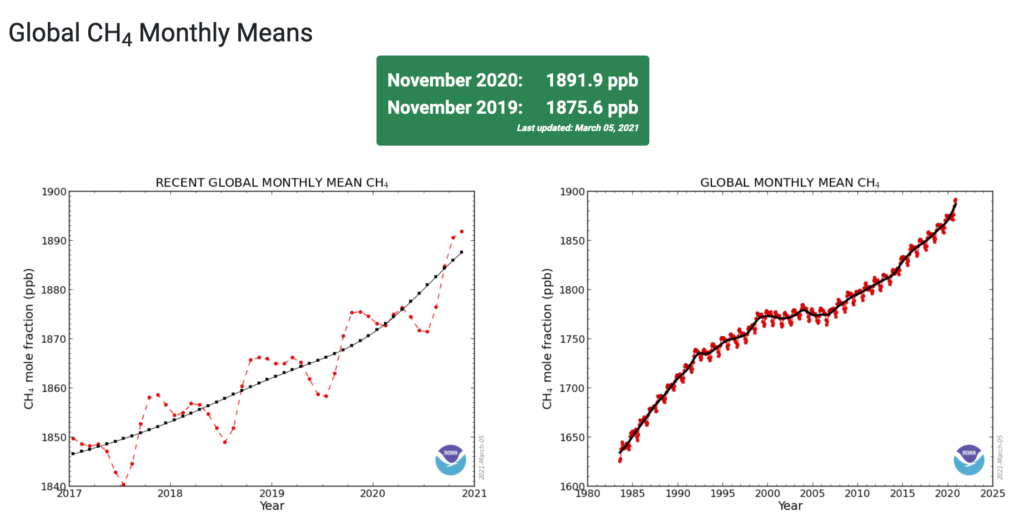The Financial Times has a news article about NOAA (National Oceanographic and Atmospheric Administration) scientists who were part of a team that analyzed global emissions for methane last year. They found that methane emissions surged to record levels in 2020, despite much of the world being on lockdown due to Covid-19. Carbon dioxide levels also surged, and would have been at record levels if it weren’t for the Covid-19 lockdown.
Why is this a problem?
Methane is one of the most potent greenhouse gases (GHG) that exist. Methane is 28 times more potent than carbon dioxide over a 100 year period. Having methane surge during a global economic slowdown, when there was far less use to power closed factories and restaurants, is very worrisome.
Carbon dioxide is the chief GHG, and stays in the air for 100 years once it’s created.
Scientists are still analyzing where the increased methane emissions came from last year. Preliminary analysis shows it likely came from biological sources (wetlands, agriculture), and not so much from human sources.
What can we do about it?
If the increased methane is coming from natural sources such as wetlands or melting permafrost, that shows us that climate change is already affecting the world. The best thing we can do for this is to dramatically lower human produced methane – from fossil fuel production and use. This includes transportation, heating and cooking in buildings, and in power plants.
This is also even more reason for the US to do its Fair Share towards climate reduction – we have produced most of the GHG in the air, and we have the strongest financial ability to reduce our GHG and help other less developed countries decrease their GHG. Therefore we should reduce our emissions to 70% of 2005 levels, by 2030. That is just 9 years.
What can you do?
We have an action letter that will let the president, your US senators and representative, and your state senators and representative know that time is urgent and we need to reduce our emissions by 70%.
Please contact your elected officials as soon as possible, the President is releasing his plan in a little over a week.
There are other things we can do, that could help, though not quite as much as a strong federal and state policy. There are reports that certain seaweeds keep cows from making so much methane, and it only takes a small amount of seaweed to make a difference. Farmers could start using the seaweed right away. As an individual, we can eat less beef or dairy and more of a plant-based diet.
As individuals, we can reduce our energy use: weatherize our homes, walk, bike, or use transit whenever possible, and if you need to replace your furnace or gas stove get a heat pump or electric stove.
Read the Financial Times article here.
Read the NOAA report here.
Read more about the US Fair Share here and here.
04/12/2021





